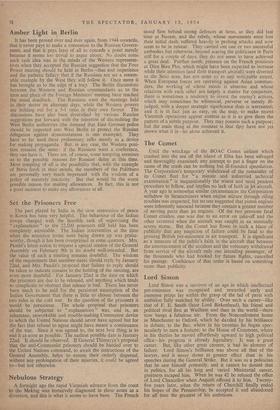It has been proved over and over again, from 1944
onwards, that it never pays to make a concession to the Russian Govern- ment, and that it pays least of all to concede a point merely because it seems too trivial to argue about. No doubt some such rash idea was in the minds of the Western representa- tives when they accepted the Russian suggestion that the Four Power meeting should be held in Berlin—that and impatience and the pathetic fallacy that if the Russians are set a reason- able example by the West they will follow it. Once more it has brought us to the edge of a trap. The Berlin discussions between the Western and Russian commandants as to the time and place of the Foreign Ministers' meeting have reached the usual deadlock. The Russians want the meetings held in their sector on alternate days, while the Western powers are holding out for a 3-1 ratio in their own favour. The discussions have also been diversified by various Russian suggestions put forward with the intention of discrediting the West Berlin authorities (the demand that East German police should be imported into West Berlin to protect the Russian delegation against demonstrations is one example). They have so far used these preliminary talks merely as a device for making propaganda. But, in any case, the Western posi- tion remains the same: if the Russians want a conference, they can have it. There are, of course, some tempting surmises as to the possible reasons for Russian delay at this time. Most tempting of all is the possibility that, with the example of Beria fresh in their minds, the members of the Politburo are personally very much impressed with the wisdom of a policy of masterly inactivity. But that would be the worst possible reason for making allowances. In fact, this is not a good moment to make any allowances at all.


































 Previous page
Previous page